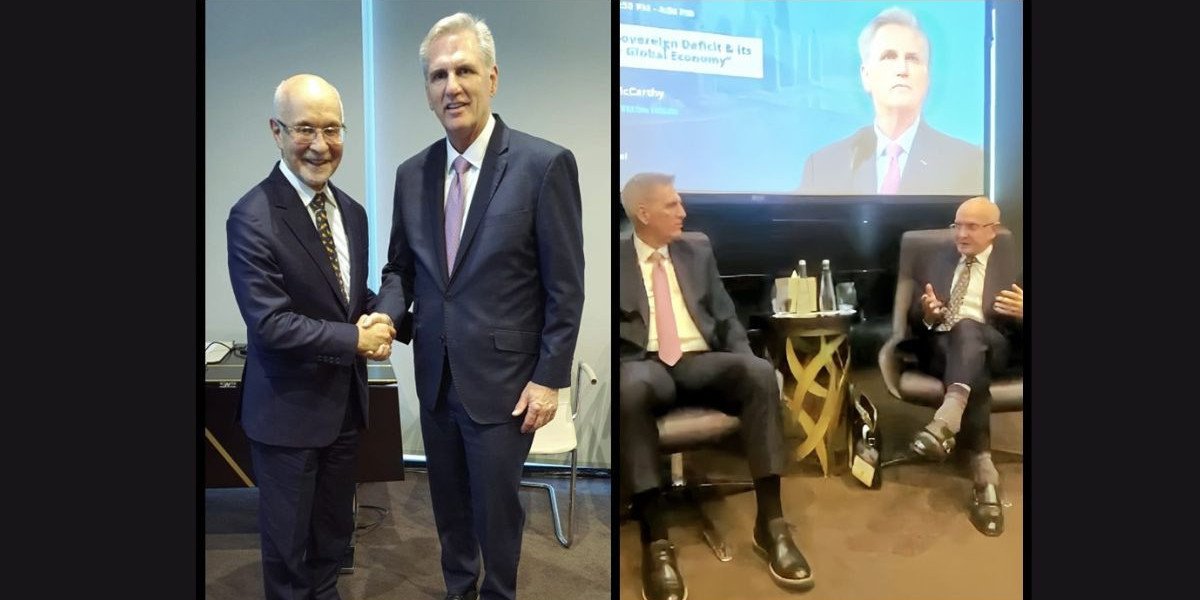Introduction: A Critical Dialogue on Economic Uncertainty
At the recent AIM Summit in Dubai, former US House Speaker Kevin McCarthy led an exclusive roundtable discussion on global sovereign debt, political instability, and emerging market volatility. The session, which was moderated by David Gibson-Moore, offered deep insights into how economic and political shifts are reshaping financial markets worldwide.
McCarthy focused on two key concerns that dominated discussions throughout the event:
The impact of rising sovereign debt on financial stability
The effects of increasing political polarization on economic growth
With major economies struggling to balance debt management, inflation control, and sustainable growth, this dialogue provided valuable perspectives on navigating economic uncertainty in 2024 and beyond.
The Sovereign Debt Crisis: A Global Economic Burden
Excessive Government Borrowing and Its Consequences
Governments worldwide continue to rely heavily on debt financing to fund public expenditures, leading to significant concerns about long-term economic stability. McCarthy emphasized that the increasing reliance on debt has led to:
Rising debt-to-GDP ratios in advanced economies
Higher interest rates as central banks attempt to curb inflation
Market instability due to concerns over fiscal sustainability
Debt Management Strategies and Economic Risks
The ongoing debt crisis raises fundamental questions about how governments will manage their financial obligations without stifling growth.
Should central banks prioritize inflation control or economic growth?
How can governments ensure that debt-driven investments remain productive?
What role will international financial institutions play in stabilizing markets?
McCarthy noted that without decisive policy action, global economies could see weaker growth, increased financial instability, and heightened investment risks.
Political Polarization and Economic Consequences
The Growing Divide in Western Democracies
One of the most pressing concerns raised at AIM Summit Dubai was the deepening political divide in Western democracies, particularly in the United States. Partisan conflicts and policy gridlock have made it increasingly difficult to implement sound economic strategies, leading to:
Delayed policy decisions affecting infrastructure and investment
Reduced investor confidence in government-led economic initiatives
Disruptions in global trade agreements due to shifting political priorities
The “EM-ification” of the US Economy
McCarthy highlighted how some analysts view the United States as resembling an emerging market in key ways, a trend referred to as "EM-ification". This shift is characterized by:
Increasing political instability affecting financial markets
Weakened institutions struggling to enforce economic policies
Heightened income inequality contributing to social unrest
If left unchecked, these trends could erode investor trust, slow economic growth, and make financial markets more volatile.
Emerging Market Trends and Investment Challenges
Opportunities in Emerging Markets
Despite rising risks, emerging markets continue to offer lucrative investment opportunities, especially in sectors such as:
✅ Technology and digital infrastructure
✅ Renewable energy and sustainability initiatives
✅ Agriculture and food security
✅ Urban expansion and real estate development
Challenges Facing Emerging Economies
However, investing in emerging markets also carries significant risks, including:
Currency volatility due to inflationary pressures
Regulatory instability affecting foreign investments
Geopolitical tensions that disrupt trade and supply chains
Investors must take a strategic and risk-managed approach to maximize returns while navigating economic uncertainties.
Strategies for Navigating the Global Economic Landscape
Key Takeaways from AIM Summit Dubai
To address the challenges discussed at the summit, policymakers and investors should focus on:
Balancing debt and economic growth by implementing sustainable fiscal policies
Promoting bipartisan cooperation to reduce political instability
Strengthening global trade alliances to counteract market volatility
Investing in high-growth sectors that offer long-term economic resilience
The Path Forward
McCarthy emphasized that while the global economy faces significant risks, there are also unprecedented opportunities for strategic investment and policy reform. By focusing on innovation, financial resilience, and political stability, economies can emerge stronger despite ongoing uncertainties.
Conclusion: Preparing for an Uncertain Future
The AIM Summit Dubai provided valuable insights into the evolving global economy, highlighting the urgent need for economic reforms, debt management strategies, and political stability. Kevin McCarthy’s discussion underscored the importance of proactive policymaking and investment diversification in ensuring a more stable and resilient future.
As we move into an era of heightened financial volatility, it is crucial for businesses, investors, and policymakers to stay informed and adapt to the shifting economic landscape.







